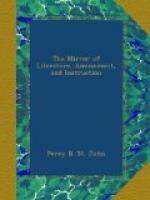* * * * *
THE GATHERER.
FREDERICK I. OF PRUSSIA,
Whose chief pleasure was in the proficiency of his troops in military discipline, whenever a new soldier made his first appearance in the guards, asked him three questions. The first was, “How old are you?” the second, “How long have you been in my service?” and the third, if he received his pay and his clothing as he wished.
A young Frenchman, who had been well disciplined, offered himself to enter the guards, where he was immediately accepted, in consequence of his experience in military tactics. The young recruit did not understand the Prussian language; so that the captain informed him, that when the king saw him first on the parade, he would make the usual inquiries of him in the Prussian language, therefore he must learn to make the suitable answers, in the form of which he was instructed. As soon as the king beheld a new face in the ranks, taking a lusty piece of snuff, he went up to him, and, unluckily for the soldier, he put the second question first, and asked him how long he had been in his service. The soldier answered as he was instructed, “Twenty-one years, and please your Majesty.” The king was struck with his figure, which did not announce his age to be more than the time he answered he had been in his service. “How old are you?” said the king, in surprise. “One year, please your Majesty.” The king, still more surprised, said, “Either you or I must be a fool!” The soldier, taking this for the third question, relative to his pay and clothing, replied, “Both, please your Majesty.” “This is the first time,” said Frederick, still more surprised, “that I have been called a fool at the head of my own guards.”




